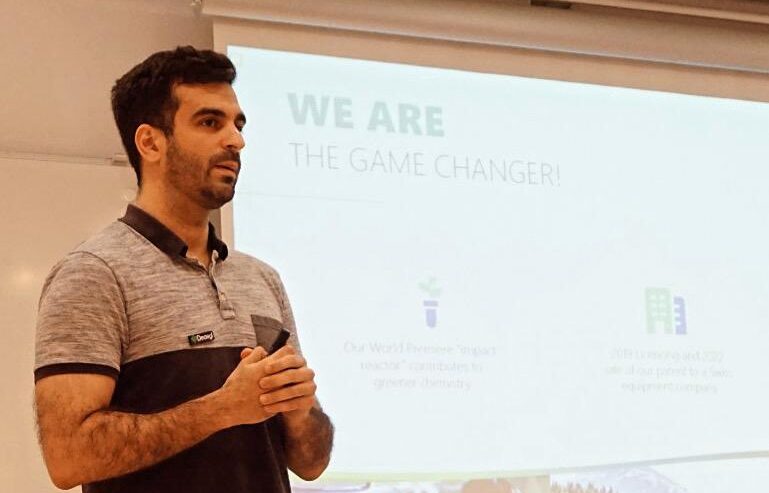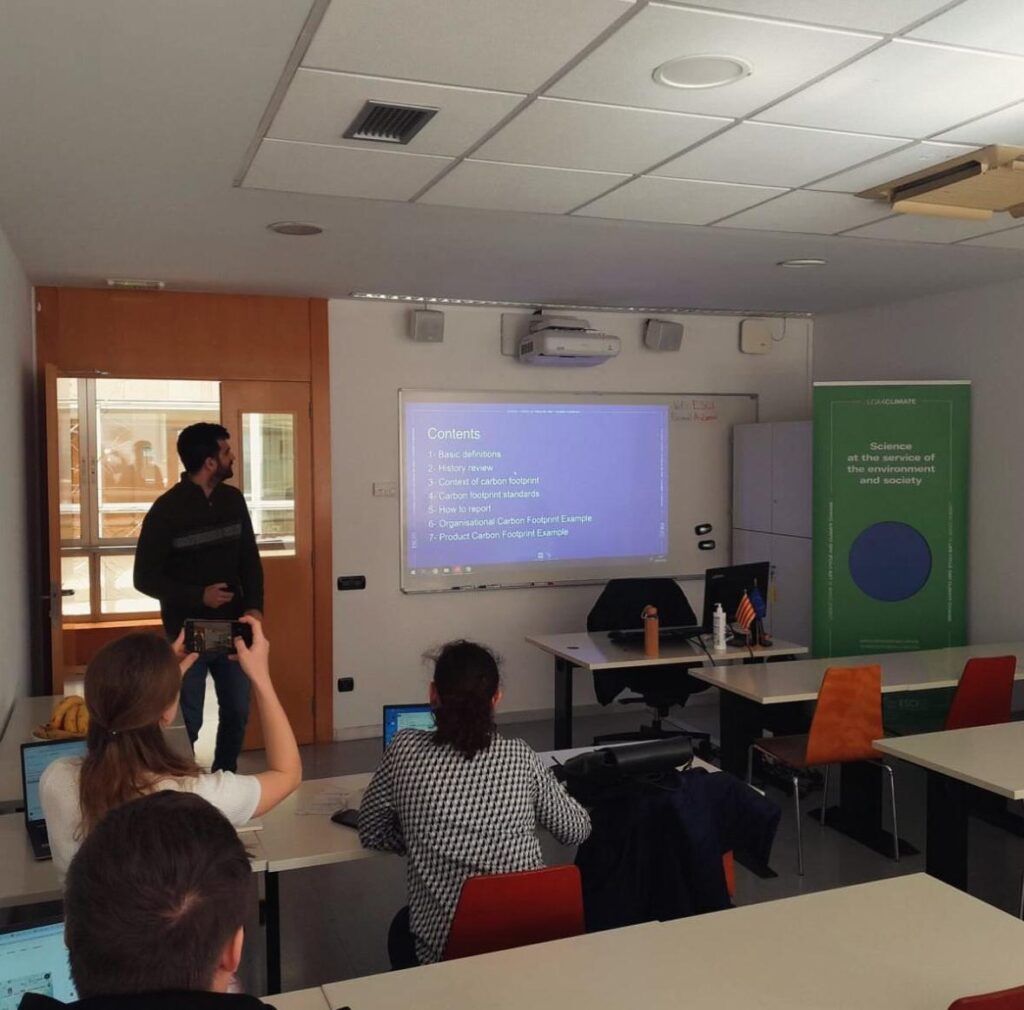I’m a chemical engineer turned sustainability expert, with a Ph.D. in Environmental Sciences (LCA as a tool for the industrialisation of chemical and mechanochemical processes). After early roles at Dow and Clariant, I shifted to sustainability. Working with startups such as Deasyl SA on green chemistry, biofuels, and energy storage not just to measure impact, but to make mine matter.
During my Ph.D., I’ve worked with the UNESCO Chair in Life Cycle and Climate Change, participated as observer at COP27 and spoken at SETAC Europe, LCIC and much others congresses. I also taught LCA and PCF/OCF in masters and others post graduated courses in the UPF-BSM and ESCI. I even had the opportunity to spend some months in Pontificia Universidad Católica de Chile, where I fell in love with the nature from the south of the country in La Patagonia. That connection stays with me — I’ve always felt most grounded in nature, and I want my work to help protect it.
Now at Ravago, I drive LCA strategy and decarbonization, aligning business with science to enable real, measurable impact.
Previous LCA and Carbon Footprint projects
- Automatizing Ravago’s Product Carbon Footprinting process allowing them to calculate >200 PCF per year.
- PhD thesis: Life cycle assessment as a tool for the industrialisation of chemical and mechanochemical processes.
- Organisational carbon footprint at PRBB (health sector)
- Organisational carbon footprint at GCR (plastics recycling)
- Organisational carbon footprint at the Port Authority of Las Palmas.
- LCA of PHB (bioplastic) production at University Rovira i Virgili (URV)
- LCA of several developing processes (TRL2 to TRL5) at Deasyl SA
- LCA of 13 products of Trumpler (leather industry)
- LCA of an oxalic acid production facility in Spain
- Publication of two EPDs for Celsa Group’s steel products (EPD-8495, EPD-8496, EPD-8504, and EPD-8505),
- Carbon footprint assessment of a green hydrogen plant in the Canary Islands (Disa and Enagás)
Publications in International Scientific journals
PUBLISHED AS FIRST AUTHOR
- S. Arfelis et al., “Architecture Development to Incorporate Industry 4.0 Solutions to Plastics Management: Circular Economy,” Springer, doi: 10.1007/978-3-030-90033-5_14
- S. Arfelis et al., “Life cycle assessment as a tool for evaluating chemical processes at industrial scale: a review,” Green Chemistry, vol. 24, no. 20, pp. 7751–7762, 2022, doi: 10.1039/d2gc02089k
- S. Arfelis et al., “Linking mechanochemistry with the green chemistry principles: Review article,” Jul. 30, 2024, Elsevier Ltd. doi: 10.1016/j.heliyon.2024.e34655
- S. Arfelis et al., “Life cycle assessment on calcium zincate production methods for rechargeable batteries,” Science of the Total Environment, vol. 866, no. December 2022, p. 161094, 2023, doi: 10.1016/j.scitotenv.2022.161094
- S. Arfelis et al., “Wood Chips Components Separation with a New Wet-Milling Process Compared to Chemical Depolymerization: A Technical, Economic, and Environmental Comparison,” ACS Sustain Chem Eng, 2023, doi: 10.1021/acssuschemeng.3c07477
- S. Arfelis et al., “Sustainability of cellulose micro-/nanofibers: A comparative life cycle assessment of pathway technologies,” Science of the Total Environment, vol. 874, no. January, p. 162482, 2023, doi: 10.1016/j.scitotenv.2023.162482
- S. Arfelis et al., “Comparative environmental and economic assessment of nicotine extraction from tobacco leaves: Mechanochemical vs maceration processes at laboratory scale,” Heliyon, vol. 12, no. 1, January 2026, doi: 10.1016/j.heliyon.2025.e44292
PUBLISHED AS A CO-AUTHOR
- A. Bala, S. Arfelis, H. Oliver-Ortega, and J. A. Méndez, “Life cycle assessment of PE and PP multi film compared with PLA and PLA reinforced with nanoclays film,” J Clean Prod, vol. 380, p. 134891, Dec. 2022, doi: 10.1016/J.JCLEPRO.2022.134891
- F. Serra-Parareda, R. Aguado, S. Arfelis, R. Xifré, P. Fullana-i-Palmer, and M. Delgado-Aguilar, “Techno-economic and environmental evaluation of a market pulp reinforced with micro-/nanofibers as a strengthening agent in packaging paper,” J Clean Prod, vol. 347, p. 131265, May 2022, doi: 10.1016/J.JCLEPRO.2022.131265
- I. Sazdovski, M. Z. Hauschild, S. A. Espinosa, A. Bala, and P. Fullana-i-palmer, “Short Communication: Biogenic Carbon in fast-moving products: a deception or real contribution to circularity?,” Environmental Advances, p. 100461, 2023, doi: 10.1016/j.envadv.2023.100461
FAQs
What is Life Cycle Assessment (LCA) and why is it important?
Life Cycle Assessment (LCA) is a method used to evaluate the environmental impacts of a product, process, or service throughout its entire lifecycle—from raw material extraction to disposal. It's essential because it helps businesses identify areas where they can reduce their environmental footprint, make more sustainable decisions, and comply with environmental regulations.
How can LCA benefit my company?
LCA can provide valuable insights into how your products or processes impact the environment. By understanding these impacts, you can reduce resource use, cut emissions, and improve your sustainability credentials—ultimately enhancing your brand reputation and potentially lowering costs through more efficient practices.
What industries can benefit from sustainability assessments?
Sustainability assessments, including LCA, are valuable across numerous industries—especially those with significant environmental footprints like construction, oil and gas, transport, chemical manufacturing, plastics, pharma... Any company looking to reduce its environmental impact can benefit from these services.
How does your experience in academia and industry benefit my business?
With over a decade of experience across multinational corporations, academia, and startups, I bring a comprehensive understanding of both theoretical and practical aspects of sustainability. This allows me to offer tailored solutions that are not only scientifically sound but also actionable and results-driven for your business.
What’s the difference between a carbon footprint analysis and an LCA?
A carbon footprint analysis focuses specifically on the greenhouse gas emissions associated with a product, service, or process, typically measured in terms of carbon dioxide equivalents. LCA, on the other hand, evaluates a wider range of environmental impacts—such as water use, energy consumption, and pollution—throughout the entire life cycle.
Can small businesses benefit from LCA and sustainability assessments?
Absolutely! Small businesses can gain a competitive edge by adopting sustainable practices early on. LCA helps identify opportunities to reduce costs, minimize environmental impacts, and meet growing consumer demand for eco-friendly products and services.

